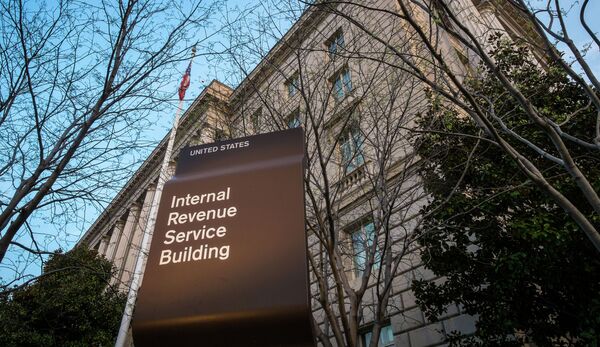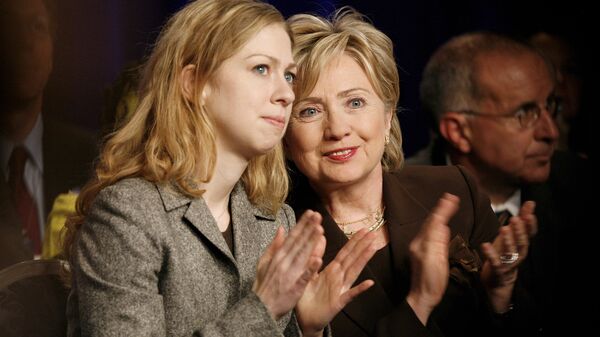Lawrence W. Doyle and John F. Moynihan, both graduates of the Catholic Jesuit College of the Holy Cross and independent expert forensic investigators, came to prominence on 13 December 2018 when they testified before the House Oversight and Government Reform Committee on the Clinton Foundation's alleged fraud.
According to them, the charity does not operate as a tax-exempt 501(c)(3) organisation and has acted as nothing short of a foreign agent "throughout its existence". Summarising their conclusions the two Jesuit alumni suggested that the Clinton Foundation owes between $400 million and $2.5 billion in taxes and informed US lawmakers that if the IRS refuses to consider their "tax claim" they would appeal to the US Tax Court. According to Zero Hedge, the ongoing litigation is apparently related to this very case.
Multinational Charities "Perfect" Disguise for Money Laundering
Charles Ortel, a Wall Street analyst and investigative journalist who has been conducting a private inquiry into the Clinton Foundation for several years opines that the aforementioned legal case may involve unprosecuted crimes by some “charities” operated by political dynasties and may even put the IRS itself under the microscope.
"I believe that Doyle and Moynihan, like most concerned citizens, want the IRS to enforce charity laws and regulations fairly, without regard to whether a given charity might be linked to a Republican, Democrat, or Independent person", he says, specifying that the precise claim and details of the legal case in question are unknown since they're sealed by the court.
According to Ortel, multinational charities have become “perfect” vehicles for disguising money laundering and influence peddling since regulators do not have enough resources to check their revenues and spending scrupulously especially when these non-profits are operating abroad.
"Compounding the above problems is the fact that numerous foreign actors including governments, companies, and individuals are eager to curry favour with sitting or rising politicians who, typically, are also hungry for financial support", he suggests. "While foreign interests are barred from directly supporting or financing political candidates, they are allowed to 'contribute' to charities in which dynastic political families have interests or associations".

Why IRS & FBI Turns a Blind Eye to Loosely Operated Charities
To illustrate his point Ortel referred to the Clinton Foundation that has repeatedly come under the spotlight being suspected of alleged "pay-to-play" schemes. Echoing Doyle and Moynihan, Ortel believes that the Clinton Foundation cannot be called a "charity" since its operations in the US and abroad go beyond charitable activities. Furthermore it is neither validly organised nor properly audited, he highlights. The Wall Street analyst raises the question as to why the supposed violations have remained unnoticed by the FBI and IRS for over a decade.
Referring to page 432 of the first IG Horowitz Report, Ortel notes that the FBI opened investigations into the Clinton Foundation in January 2016. By July 2016, the IRS too confirmed that they had opened a Clinton Foundation investigation, he points out. However, nothing has been heard since then about the cases.
The Washington Post reported on 10 January that John Huber, the US attorney in Utah, who was appointed by then-Attorney General Jeff Sessions in November 2017 to look into the FBI handling of possible corruption at the Clinton Foundation and Hillary Clinton's alleged pay-to-play schemes during her tenure as secretary of state, "found nothing worth pursuing". The media outlet specified, however, that "the assignment has not formally ended and no official notice has been sent to the Justice Department or to lawmakers", citing knowledgeable sources.
"What I suspect is that bureaucrats and others in the IRS and Department of Justice have been reluctant to press into their investigations because high level current and former politicians and powerful donors, across the political spectrum are likely implicated in trafficking influence through these false-front charities, and others", Ortel presumes.
US Debt is Soaring While "Charities" Sit on Trillions
The Wall Street analyst explains why financial violations and fraud on the part of charitable organisations are fraught with risks for national economies and societies.
"One hopes that the overwhelming majority of American charities abide by relevant laws", he says. "This is likely true concerning charities that tackle local, state, or national challenges, but American charities and foreign charities that operate internationally are rife with potential for fraud and corruption".
He points out that this is particularly true when it comes to disaster relief when "pocketbooks open instantly and large sums swarm" towards various "tax-exempt organisations" often connected to celebrities that say they are going to help.
Ortel bemoans that fact that "afterwards, too frequently as in the case of Haiti, for example, there is no rigorous accounting for the vast sums claimed as donations or expenses". The Clinton Foundation's role in fundraising to tackle the consequences of the 2010 Haiti earthquake is still triggering controversy and was addressed by Donald Trump during his 2016 campaign.
"In 2020, America has run up a mountain of government debt and we see little progress in paring back soaring annual government deficits that add to our monstrous debt pile", the investigative journalist emphasises. "At the same time, loosely regulated charities, some funded by monopolists and near monopolists sit on trillions of dollars of unencumbered assets inside private foundations or public charities".
According to him, if the IRS and Department of Justice did their best to enforce existing laws and regulations that prohibit certain tax-exempt organisations from enriching themselves "vast sums could be raised to help reverse erosion in [the US] national balance sheet".
Ortel expresses hope that the effort spearheaded by Doyle and Moynihan will help restore confidence in the administration of justice.


